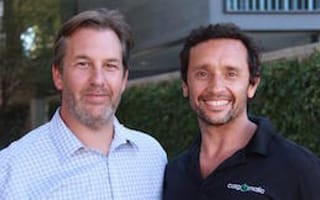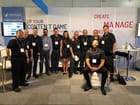X Marks the Spot: Xfernet Spotlight Series on Technology Leaders in Los Angeles
This interview series is designed to showcase successful entrepreneurs and executives who are recognized thought leaders and visionaries in the Los Angeles technology community.
Episode 1: Jonathan Kessler, CEO and Co-Founder, Cargomatic
[ibimage==39233==Original==none==self==ibimage_align-left]
A serial technology entrepreneur with a proven track record of success, Jonathan heads up Cargomatic, a company that has created a technology platform to connect shippers and qualified carriers in real-time so that unutilized capacity of local trucks can be used for business efficiently and transparently.
Xfernet: Jonathan, thanks for joining us today. Your background is fascinating, having diverse experience in various industries, and for almost every part of your CV, technology has played a central role. What are your personal thoughts on technology and innovation, and what have they meant to you in your career?
Jonathan Kessler: I believe everyone has internal interests, things they get passionate about, things that get them excited. For me, from an early age, it was technology. I got my first computer when I was 13 years old (an Apple II Plus), and it seemed like magic to me. I was really interested to see what was next: I could read about something new that hadn’t even been invented a week ago, that’s how fast things were moving – which was exciting. Back then, content wasn’t distributed as widely as it is now, so I would pour over magazines like Byte to read about all the new things coming out on computers and computing in general, and I’d get really passionate about it. By nature, I like to build things, so technology gave me a medium in which I could be creative and build something from nothing.
With technology, you can be one person creating something that can be used by many people. The leverage of technology can be so great – you can have an idea and work on that idea, and have many people see what you’re working on very quickly, including yourself. I love the immediacy of technology; when I develop something that’s innovative, I can see what that means right after I’ve thought about it. It’s not like I have to build a bridge, where I have to get approvals and plans and have people spend years building it. With software technology in particular, you can have your ideas and see the tangible effects of those ideas really quickly. This makes it an amazing medium that has allowed us to innovate so rapidly, making the time to market very fast.
X: How did you come up with the idea behind Cargomatic? It’s such a simple and therefore amazing idea in terms of how it works and the purpose behind it.
JK: It was a classic example of two people with different expertise coming together and talking about a problem then coming up with a solution. I moved to LA three years ago and was talking with lots of different people at the time, thinking about what my next endeavor was going to be, and one of those people, Brett Parker, became my current business partner, who had been in the trucking world, warehousing and logistics, for many years. We were sitting in his office, there were trucks driving around, and we could not tell what their capacity was just by looking at them. I realized how difficult it was to find actual capacity in the local market because the capacity couldn’t be seen.
After much discussion and sharing of ideas, we came up with this concept of using a technology platform to connect shippers and local trucks in real-time to tap that unutilized capacity. From there, we spent a couple of months thoroughly vetting the idea: researching the market, networking with people in the industry to see what the appetite would be for this solution, reading market studies, digging deep to make sure that this was a viable marketplace. After figuring out what the product could do, we started to develop it.
X: A lot of brilliant people would invent great technology, but because they weren’t business people, they weren’t successful at building a business around it. In this brave world of startups, does this remain a challenge? Or have people gotten better at balancing their technology and innovation skills with a business sensibility?
JK: There’s more information out there than there ever has been before and access to that information is much easier. People can leverage what they find online to learn how to do things that they haven’t done before. If you’re willing to do your homework, it is easier today than it was before.
It’s always going to be a challenge for some people to adopt that kind of business mind, but more than anything, what is really important is to understand your strengths and what your weaknesses, then look for people who can complement your skills set. It could be finding a subject matter expert in a given area you want to build a business in, or someone who’s great at marketing while you’re great at product. Nobody (or very, very few out there) is going to be good at everything.
Surrounding yourself with people who have complementary skills to you – that is a critical part of being an entrepreneur. My philosophy on entrepreneurship is that it’s figuring out how to find good people then bring them along for the ride. I’ve never been the kind of person who needs to be in charge and in control. I’m more about wanting to win, and I want to work with people who are smart, who can do things that I can’t do, and together we can go out and build a successful company.
X: You’ve continued to successfully build your business. What is your approach when it comes to having functions in-house vs. outsourced?
JK: There’s a time and place for everything, so what you have in-house and what you outsource can change over time. You should always go with your core competency, so whatever that is, that should be in-house. It’ll always be a mix because you can’t be good at everything at all times.
I’ve been working in technology for a long time, and I remember the days when you didn’t have outsourcing options for something like IT infrastructure. That meant you had to run it yourself, practically building your own data center, buying your servers, having battery backups in case things went down, etc. I’m glad those days are behind us – that was not fun. It was extraordinarily expensive, and you had to get a whole team of experts who knew how to do all those things. You don’t have to do that anymore.
A perfect example of outsourcing that makes sense for almost everyone is the data center and IT infrastructure. Finding a good outside source for that gives you a lot of flexibility to focus on what you do great, whether that’s building a great product, or anything else. You want to go with what your strength is and accept that you don’t have to be great at everything.
X: You’ve been in LA for about three years, which is interesting because that’s about the time when this tech boom really started to take off here, bringing such a new, fresh tech landscape for this city. Why did you choose to have your business grounded here in LA?
JK: After living in San Francisco for 17 years, I was ready to take on a new environment. One of the great things about technology is that you can do it anywhere, of course, so I knew I could do what I was doing in San Francisco in Los Angeles. I came here and just loved being here – the weather, the people, the beach, all of those things. When you’re in a good place mentally and emotionally, it’s much easier to build a business.
What’s required to build a business is a good idea, and executing on that idea, with good people to help you. You also need a rich community to bounce ideas off of, to learn things from, with a vast network including experts and angels. That’s the underpinnings of an ecosystem that allows companies to prosper, and I can count on all of that here in LA. LA has all of those key resources, making it very fertile ground for a business to grow and prosper.
X: Cargomatic is already doing so well, with prosperity clearly more to come. What’s next?
JK: We continue to want to solve problems and build value for our customers, and you do that by hiring great people. Looking for great people out there to join our team so we can build a great product and provide that value back to our customers. If you do so, you make relevant software and provide value, then you’re going to be successful.
Personal goal is to simply be happy and enjoy life while I’m doing this crazy thing. The more successful I am at staying healthy and happy, the more successful I’ll be with the business.
If you found this article of interest and have questions regarding it. Please contact:
Joseph Swasey
Sales Executive at Xfernet
[email protected]
[ibimage==39231==Small==none==self==ibimage_align-left]






